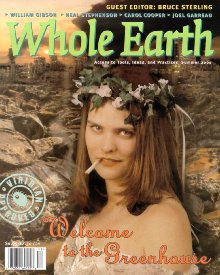
Whole Earth Review was a magazine which was founded in January 1985 after the merger of the Whole Earth Software Review and the CoEvolution Quarterly. All of these periodicals are descendants of Stewart Brand's Whole Earth Catalog.

Stewart Brand is an American project developer and writer, best known as the co-founder and editor of the Whole Earth Catalog. He has founded a number of organizations, including the WELL, the Global Business Network, and the Long Now Foundation. He is the author of several books, most recently Whole Earth Discipline: An Ecopragmatist Manifesto.

Internet culture is a quasi-underground culture developed and maintained among frequent and active users of the Internet who primarily communicate with one another online as members of online communities; that is, a culture whose influence is "mediated by computer screens" and information communication technology, specifically the Internet.

The Whole Earth Catalog (WEC) was an American counterculture magazine and product catalog published by Stewart Brand several times a year between 1968 and 1972, and occasionally thereafter, until 1998.

Flower power was a slogan used during the late 1960s and early 1970s as a symbol of passive resistance and nonviolence. It is rooted in the opposition movement to the Vietnam War. The expression was coined by the American Beat poet Allen Ginsberg in 1965 as a means to transform war protests into peaceful affirmative spectacles. Hippies embraced the symbolism by dressing in clothing with embroidered flowers and vibrant colors, wearing flowers in their hair, and distributing flowers to the public, becoming known as flower children. The term later became generalized as a modern reference to the hippie movement and the so-called counterculture of drugs, psychedelic music, psychedelic art and social permissiveness.

"The Mother of All Demos" was a landmark computer demonstration of developments by the Augmentation Research Center, given at the Association for Computing Machinery / Institute of Electrical and Electronics Engineers (ACM/IEEE)—Computer Society's Fall Joint Computer Conference in San Francisco, by Douglas Engelbart, on December 9, 1968. The name The Mother of All Demos has been retroactively applied to the demonstration.

Out of Control: The New Biology of Machines, Social Systems, and the Economic World (ISBN 978-0201483406) is a 1992 book by Kevin Kelly. Major themes in Out of Control are cybernetics, emergence, self-organization, complex systems, negentropy and chaos theory and it can be seen as a work of techno-utopianism.

CoEvolution Quarterly (1974–1985) was a journal descended from Stewart Brand's Whole Earth Catalog. Brand founded the CoEvolution Quarterly in 1974 using proceeds from the Whole Earth Catalog. It evolved out of the original Supplement to the Whole Earth Catalog. Fred Turner notes that in 1985, Brand merged CoEvolution Quarterly with The Whole Earth Software Review to create the Whole Earth Review.
Elie Abel was a Canadian-American journalist, author and academic.
The Spring Mobilization Committee to End the War in Vietnam, which became the National Mobilization Committee to End the War in Vietnam, was a coalition of American antiwar activists formed in November 1966 to organize large demonstrations in opposition to the Vietnam War. The organization was informally known as "the Mobe".

Cyberdelic was the fusion of cyberculture and the psychedelic subculture that formed a new counterculture in the 1980s and 1990s.
The Portola Institute was a "nonprofit educational foundation" founded in Menlo Park, California in 1966 by Dick Raymond. The Portola institute helped to develop other organizations such as The Briarpatch Society and Bob Albrecht's People's Computer Company. It was also the publisher of Stewart Brand's Whole Earth Catalog beginning with the first issue in 1968. The first issue of The Whole Earth Catalog notes that the catalog is one division of The Portola Institute and that other activities of the Institute include: "computer education for all grade levels, simulation games for classroom use, new approaches to music education, Ortega Park Teachers Laboratory." Raymond and Brand later collaborated to form the Point Foundation.
Marita Sturken is an American scholar, author, professor, and critic.

The Hackers Conference is an annual invitation-only gathering of designers, engineers and programmers to discuss the latest developments and innovations in the computer industry. On a daily basis, many hackers only interact virtually, and therefore rarely have face-to-face contact. The conference is a time for hackers to come together to share ideas.
Cyber-utopianism or web-utopianism or digital utopianism or utopian internet is a subcategory of technological utopianism and the belief that online communication helps bring about a more decentralized, democratic, and libertarian society. The desired values may also be privacy and anonymity, freedom of expression, access to culture and information or also socialist ideals leading to digital socialism.
Dennis Allison is a lecturer at Stanford University, a position he has held since 1976.
"All Watched Over by Machines of Loving Grace" is a poem by Richard Brautigan first published in his 1967 collection of the same name, his fifth book of poetry. It presents an enthusiastic description of a technological utopia in which machines improve and protect the lives of humans. The poem has counterculture and hippie themes, influenced by Cold War-era technology. It has been interpreted both as utopian and as an ironic critique of the utopia it describes. It is Brautigan's most frequently reprinted poem.
Shanto Iyengar is an American political scientist and professor of political science at Stanford University. He is also the Harry & Norman Chandler Professor of Communication at Stanford, the director of Stanford's Political Communication Lab, and a senior fellow at the Hoover Institution.

The Vietnam stab-in-the-back myth asserts that the United States' defeat during the Vietnam War was caused by various American groups, such as civilian policymakers, the media, antiwar protesters, the United States Congress, or political liberals.

John Coate is an American media executive and advocate for online communities. He was one of the original members of The Farm, an intentional community founded in 1971, and brought lessons learned from building that community to bear in his work online.












